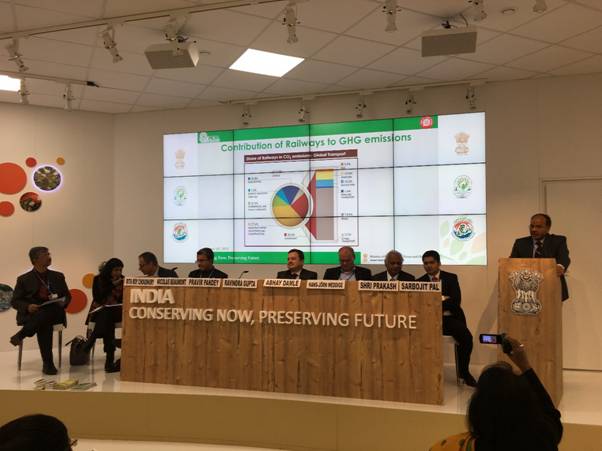Indian Railways Striding on Low Carbon Pathway
New Delhi: Ministry of Railways hosted a side event titled, “Indian Transport Sector: Marching towards sustainable mobility” at Conference of Parties (COP-23), Indian Pavilion at Bonn, Germany on 14th November 2017. Two sessions were organized as a part of this side event, first session highlighted efforts of Indian Railways towards a low carbon pathway and the second was dedicated to overall sustainable mobility initiatives in Indian transport sector. The event was attended by nearly 50 national and international participants. With eminent national and international speakers, policy makers, industry representatives etc., the sessions and discussions were engaging and thought provoking.
The discussions centered around the role of Indian transport sector, particularly the pivotal role of Indian Railways in contributing towards meeting India’s Nationally Determined Contribution (NDC) target. The event started with an Audio-Visual film on Indian Railways showcasing key low carbon transport initiatives being taken by Indian Railways such as Electrification, Energy Efficiency initiatives, renewable energy deployment etc.
In the session on “Green Transformation: Indian Transport paves the way”, Mr Ravindra Gupta, Member (Rolling Stock), Ministry of Railways, Government of India, who is on official tour to Germany, presented the quintessential role of Indian Railways in promoting sustainable mobility. He focused on the need for policy framework to stimulate modal shift. He stated that there needs to be an increasing role of renewables in Railways to achieve net decarbonization. He emphasized particularly on the innovative steps taken by Indian Railways by way of bio-toilets for having an open discharge free in line with mission of “Swachh Bharat” and an Open Defecation Free (ODF) India of Prime Minister of India, Shri Narendra Modi. Under the dynamic guidance of Minister of Railways, Shri Piyush Goyal the target for 100% completion of installing Bio-toilets in coaches has been advanced to December 2018.
The presentation by speakers was followed with interactive audience discussion. The key point emerging from the discussions was imperative to have a long term perspective of sustainability as a key factor in the future of mobility.
The session was organised in partnership with the Council on Energy, Environment and Water (CEEW) and The Energy and Resources Institute (TERI), as knowledge partners, FICCI as industry partner, and RITES as technical partner.

